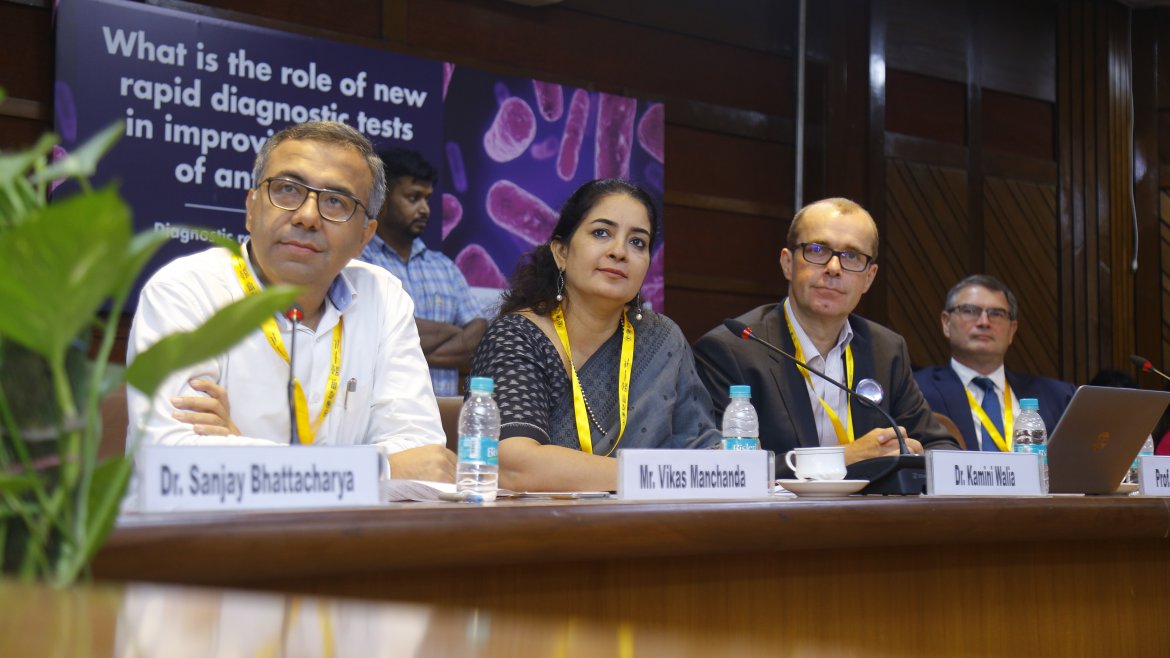Event: Introduction of new rapid tests essential to reducing unnecessary antibiotic use
09 Sep 2019
The role of rapid tests in the fight against AMR was the focus of our expert roundtable
Antibiotics have enabled us to combat disease and save millions of lives for generations, but bacteria are evolving resistance to the majority of today’s available antibiotics. With 10 million people expected to die globally by 2050 because of drug-resistant superbugs, new rapid diagnostic tests are urgently needed to reduce misuse and overuse of antibiotics. The role of rapid tests in the fight against AMR was the focus of an expert roundtable hosted today (Friday 6th September, 2019) by Biotechnology Industry Research Assistance Council (BIRAC) and Nesta Challenges.
In association with India’s National Council of Science Museums and Science Museum Group, London, the event was held to mark the opening of a landmark new exhibition ‘Superbugs: The End of Antibiotics? ’ at Delhi’s National Science Center. Global experts from the diagnostic industry, clinicians, professors and leading inventors of the rapid diagnostic tests took part in the session to explore how these rapid tests would fit in to clinical pathways in India.
Since the Chennai declaration in 2013, India has mounted a huge effort to address antibiotic resistance. Reflective of this, BIRAC is supporting several Indian start-ups and SMEs competing in the Longitude Prize – a global competition to accelerate the development of a rapid, accurate, point-of-care diagnostic test to safeguard the future of antibiotics. Innovators competing in the Prize presented their diagnostic tests to the seminar attendees – which included representatives from the Government of India’s Department of Biotechnology.

“It is not acceptable that patients still have to wait for a minimum of 24 hours to identify the right antibiotic to kill an infection. This is why the department of biotechnology and BIRAC have been collaborating with the Longitude Prize since 2014. We are giving support to indian inventors and test makers so that they can find solutions that will be used around the world to address antimicrobial resistance (AMR).”
– Dr Sundeep Sarin, Advisor Scientist-g, Department of Biotechnology, Government of India
“The potential of diagnostics in addressing AMR has been underestimated and undervalued. The Longitude Prize is a leading driver who has changed this. Today things are moving fast with new technologies enabling creation of a range of highly innovative tests that will allow more rational use of antibiotics. The market entry and adoption of these new diagnostics need to be supported so they reach patient as soon as possible.”
– Professor Till Bachmann, University of Edinburgh and Longitude Prize Judge
“Today was a unique opportunity to bring test developers together with clinicians and lab experts. This is an important exercise because test developers need to understand the questions we need to answer in hospitals and clinics.”
– Dr. Sanjay Bhattacharya, Consultant Microbiologist, Tata Medical Center, Kolkata
The exhibition ‘Superbugs: The End of Antibiotics?’ looks at all aspects of reducing antimicrobial resistance (AMR), from better hygiene and infection control to using fewer antibiotics in livestock feed and treatment. The exhibition features four teams competing in Longitude Prize – they are:
- Module Innovations (Pune, India): ‘U-Sense’ – a rapid credit card sized test that detects bacteria causing urinary tract infections (UTI) to help guide effective treatment.
- WeInnovate Biosolutions (Pune, India): ‘RAPID’ – a rapid test that identifies changes in the metabolic activity of bacteria and enables doctors to determine which antibiotics will effectively kill a given bacteria
- Lumos Diagnostics (Carlsbad, USA): ‘FebriDx’ – a rapid test to determine whether a respiratory tract infection is viral or bacterial.
- Attomaker (Exeter, UK): ‘Attomarker’ – a rapid platform that enables multiple tests to be performed quickly including the c-reactive protein (CRP) test to know if an infection is bacterial or viral.
The Longitude Prize is still open to new registrants from across the globe. It is hosted and managed by Nesta Challenges at Nesta, the Innovation Foundation based in London.
